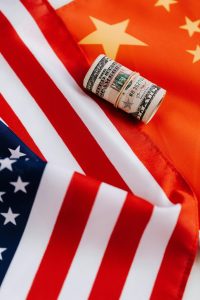How anti-Israel protests are costing companies billions of dollars

Java-chip Frappuccinos. Mango dragon-fruit refreshers. Iced white-chocolate mochas.
Sydney-based food blogger Walla Abu-Eid has amassed a massive Instagram audience by posting viral recipe videos of homemade Starbucks staples to her 240,000 followers.
The goal is not to save money by making your own delectable beverages but to steer clear of western brands that, according to Abu-Eid, support Israels war in Gaza.
Boycott Starbucks for supporting the genocide in Gaza, Abu-Eid instructs viewers in one clip from December 2023. Starbucks has lost $11 billion globally from boycotts lets keep them going!
These boycotts, stemming from a legal dispute the coffee chain had with a workers union over a pro-Palestine social-media post, have real-world impact.
In mid-August, Starbucks ousted Laxman Narasimhan as its chief executive a year-and-a-half into his role amid plummeting sales exacerbated by customer boycotts over Israel.
Starbucks shares had dropped 20% in 2024 by the time former Chipotle CEO Brian Niccol was announced as the replacement.
In May, Starbucks reported a 15% drop in net income (to $772 million) compared to this time last year.
Nowhere has Starbucks business been hurt more than in the Middle East, where it described in late January a significant impact on traffic and sales.
In March, Starbucks Middle Eastern franchisee, Alshaya Group, laid off more than 2,000 employees, or 4 percent of its workforce, as a result of the boycotts precipitating a sales downturn and continually challenging trading conditions.
In May, Starbuckss Malaysia operation, run by Kuala Lumpur-based investment company Berjaya Food Berhad, reported a third consecutive fall in revenue across its 411 licensed stores, which it attributed to an ongoing boycott, recording an almost 50% revenue decline in the first quarter of the year.
Starbucks is just one of many western brands experiencing revenue hits following boycotts and protests for their perceived support for Israel.
On social media sites, lists have been circulating of brands that should be blacklisted for their support for Israel.
Especially in Muslim-majority countries like Egypt, Indonesia, Saudi Arabia, Kuwait and Pakistan, consumers have avoided supposed pro-Israel brands such as Coca-Cola, LOral, KFC, Mcdonalds and Pizza Hut and the consumer boycott has taken a bite out of profits.
The Financial Times reported that Americana Restaurants which operates big US food chains across the Middle East including KFC, Pizza Hut and Krispy Kreme saw profits drop 40% in the second quarter of this year.
Earlier in 2024, McDonalds reported its first quarterly sales miss in nearly four years, driven by a demand slump in stores in the Middle East and in Muslim-majority countries like Indonesia and Malaysia.
That trend continued into the burger chains second quarter earnings in July where CEO Chris Kempczinski noted that we continue to be negatively impacted by the war in the Middle East, where 5% of the companys 40,000 stores are located.
McDonalds sales were hurt further after the pro-Palestinian boycott, divestment, sanctions (BDS) movement called for a global boycott of the burger giant after McDonalds Israel announced it would be giving away 100,000 free meals to Israeli security and rescue forces.
But the McDonalds corporate headquarters distanced itself from the actions of its Israel business and blamed the boycott backlash on misinformation.
McDonalds franchises in the Middle East went one step further, collectively pledging $3 million in support of Palestinians.
We ask God Almighty to protect our beloved country and all Arab and Muslim countries from all the evil and hate, read a tweet posted on McDonalds Oman business, which had pledged $100,000 to Gaza.
Launched in 2005, the BDS movement encourages consumers to shift their purchasing habits away from Israeli companies while encouraging local and national governments to boycott Israeli products and its government.
The anti-Israel movement is inspired by the widespread anti-apartheid boycott of South Africa, which helped bring an end to white rule back in 1994.
While global economic boycotts are unquestionably impacting corporate earnings, the precise, quantifiable numbers of those declines remain difficult to precisely measure among Wall Street analysts.
Boycotts are very hard to verify or quantify, [but] it is definitely something that investors are thinking about these days, said Danilo Gargiulo, a senior research analyst at investment firm AB Bernstein.
Gargiulo added that in most cases multinationals being thrust into the spotlight have sought to avoid lengthy comment to limit the noise around such boycotts. The last thing you want to do is reveal the impact and potentially bring further action against their brands, he said.
The current global economic boycott movement is unlike other boycott movements in terms of its scope and intensity.
Typical bouts of consumer outrage and accompanying boycotts tend to be fleeting, Michael Barnett, a professor of management and global business at Rutgers Business School, told The Post.
Public memory is usually short. New issues arise on an almost daily basis, crowding out concern for yesterdays news. Old habits and cravings start to outweigh lingering concerns, he said.
American clothing brand Abercrombie & Fitch is a pertinent example, having faced a viral boycott for being accused of discrimination as a brand and edging toward bankruptcy in the 2010s only to re-establishing itself as a retail behemoth whose stock price surged 285% in 2023.
Barnett noted that the Israel boycotts could, in some geographies, permanently shift consumer habits.
Egypt, for instance, experienced this phenomenon first-hand following the boycott by the Arab League of Coca-Cola from 1967 to 1991 for building a manufacturing plant in neighboring Israel.
The boycott wave helped fuel the tremendous resurgence of Spiro Spathis, which was established in 1920 as Egypts first-ever soda beverage.
BDS critics accuse the movement of unfairly singling out Israel and, in turn, harming US brands that in one way or another conduct business with Israel.
Some US states have gone so far as to adopt anti-BDS laws that make boycotting Israel illegal, including Texas, Ohio, Florida, Georgia, Pennsylvania and Colorado.
In 2016, former New York Gov. Andrew Cuomo signed an executive order to direct state agencies to stop conducting business with any institutions or companies that support the BDS movement. If you boycott against Israel, New York will boycott you, he said at the time he announced the new policy.
Many champion Cuomos actions. We should find ways to support and defend American companies who are being attacked by antisemites in foreign lands, Richard Goldberg, a senior advisor at the Foundation for Defense of Democracies who specializes in US anti-boycott laws, told The Post.
As the war in Gaza continues, many western brands in Middle Eastern markets with genuine (or apocryphal) ties to Israel expect business to flounder, or at best stall. So long as this war is going on . . . were not expecting to see any significant improvement [in the Middle East markets] . . . It’s a human tragedy whats going on and that does weigh on brands like ours, McDonalds CEO Kempczinski told investors in February.
Morning Report delivers the latest news, videos, photos and more.
Please provide a valid email address.
By clicking above you agree to the Terms of Use and Privacy Policy.
Never miss a story.
Some experts like Anson Frericks, co-founder of Strive Asset Management, suggest that more time is neede in order to determine whether Israel boycotts have a material impact on the long-term cash flow of a brand doing business with Israel.
I would want to see that theres actually a trend thats been happening for probably two or three quarters, he said, “before I would say that theres actually been a success with this boycott.”
While the consumer boycott wave shows little sign of letting up, boardrooms and executives are also beginning to have discussions over the merits of doing business with Israel at the corporate level.
In May, Barclays annual shareholder meeting was disrupted by anti-Israel protesters. Then in August, the bank announced plans to withdraw from Israeli government bond auctions, in part due to sustained calls for a boycott of Barclays over its ties to Israel and the countrys defense suppliers.
Elsewhere at Amazon, a shareholder proposal filed for its 2024 proxy vote questioned the worlds largest retailers ties to the Jewish State, stating that among the government customers Amazon Web Services (AWS) serves is the Israeli government which uses AWS to support the apartheid system under which Palestinians are surveilled, unlawfully detained and tortured.
As the war in Gaza enters its second year next month, efforts to influence and infiltrate corporate governance systems are only likely to continue.
As has already begun, ESG and DEI metrics that have so captured the attention of shareholder activists over the past decade may soon be replaced by an equally obsessive focus on BDS and Israel. Its isolation as a form of socially responsible investing and as dismal performances by DEI-focused firms suggest, its the bottom line and shareholders that always end up paying the price.
Jonathan Harounoff is the author of the forthcoming book Unveiled: Inside Irans #WomenLifeFreedom Revolt



